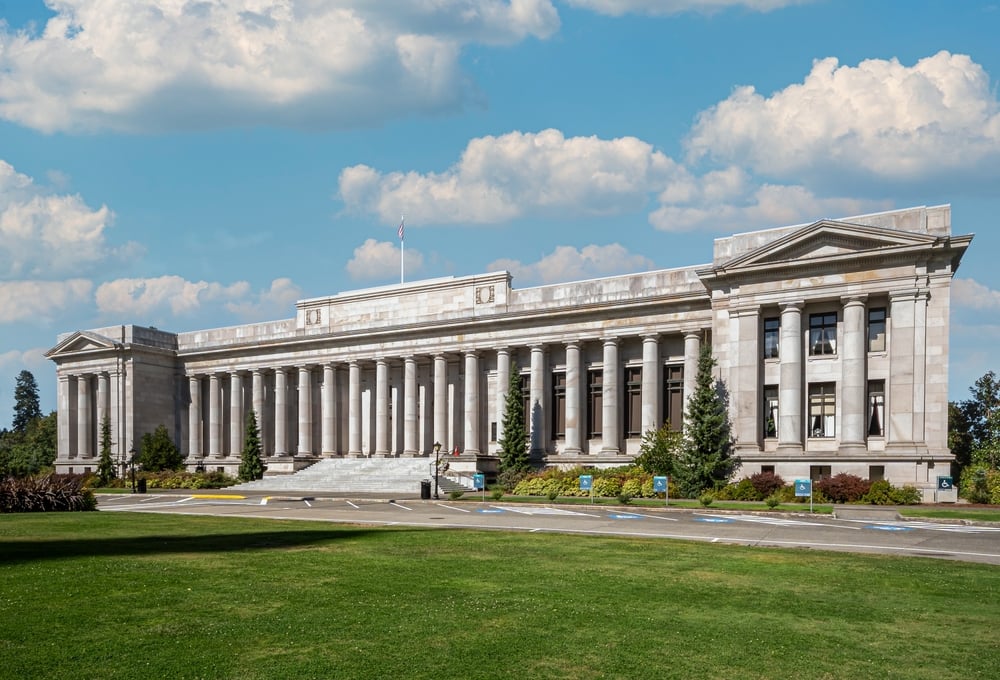Access to Justice
Nonlawyer entities could provide legal services in Washington in proposed pilot program
The Temple of Justice, where sessions of the Washington Supreme Court are convened. Nonlawyer-owned entities would be allowed to deliver legal services in Washington under a pilot program proposed by the Washington State Bar Association and a board created by the Washington Supreme Court. (Photo by Brian Logan Photography/Shutterstock)
Nonlawyer-owned entities would be allowed to deliver legal services in Washington under a pilot program proposed by the Washington State Bar Association and a board created by the Washington Supreme Court.
If the Washington Supreme Court gives its approval, nonlawyer entities with innovative business models could apply to offer legal services temporarily under an exemption to rules banning the unlicensed practice of law, according to a summary on the Washington State Bar Association’s website.
Law360 has a story on the program.
“Our data tells us that our current business models aren’t meeting the needs of all of the people in our community,” Terra Nevitt, executive director of the Washington State Bar Association, told Law360. “That tells me we need to innovate the models, and if our regulations are getting in the way, I think it’s worth testing them.”
The participating entities would have to follow ethical rules and provide information about their delivery of legal services to the public. At the end of the pilot test, the Washington Supreme Court could assess the results and decide whether to make regulatory reform more permanent.
The Washington State Bar Association and the Washington Supreme Court’s Practice of Law Board would oversee the pilot program.
“The proposed pilot test is the beginning of a process, not the end,” according to the State Bar of Washington’s website. “The goal is to learn more and make transparent, data-driven decisions before any permanent regulatory reform is put in place.”
The proposal follows adoption of programs to allow nonlawyer-owned legal businesses in Utah and Arizona.
The Utah Supreme Court approved a pilot program in August 2020 that allows temporary nonlawyer ownership or investment in law firms by entities operating in a “regulatory sandbox.” That same month and year, the Arizona Supreme Court eliminated an ethics rule barring nonlawyers from having an economic interest in firms and preventing lawyers from sharing fees with nonlawyers.
Law360 listed some of the programs implemented in Utah and Arizona. They include “one-stop-shops” that hire lawyers and other professionals, such as professional advisers.
Hello Divorce, an online platform, uses attorneys to help explain divorce steps. ZAF Legal, a legal tech company, has launched a chatbot that helps people who have been injured in accidents determine whether they have a case. Rasa Legal, an app that helps eligible people with criminal records and the expungement process, has software that helps those who want to know whether their criminal records can be expunged.
Nevitt told Law360 that Washington benefits from not being the first state to allow nonlawyer-owned legal entities.
“We’re just so grateful that they’ve laid the groundwork, so that we can learn from their experiences, and that’s what we’ve tried to do,” Nevitt said.
See also:
When it comes to deregulation of the legal industry, divisions run deep
Following decades of discourse on nonlawyer legal services, questions of motives continue
Washington Supreme Court sunsets limited license program for nonlawyers
How the Washington Supreme Court’s LLLT program met its demise




